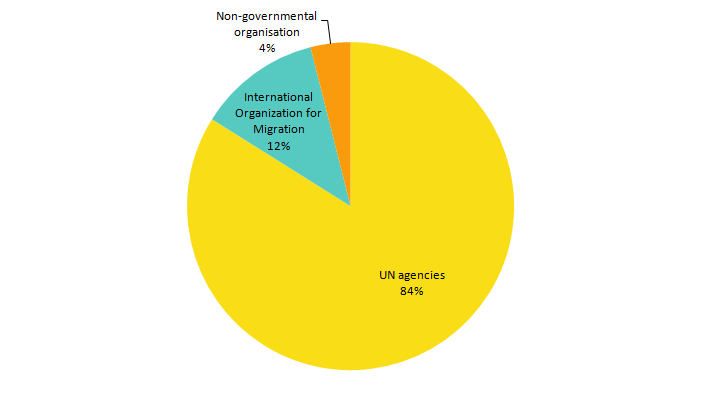UN agencies predominate as major first-level recipients to the Iraq Strategic Response Plan
Only 4% of humanitarian funding from international donors has been given directly to non-governmental organisations (NGOs); UN agencies have been the main first-level recipients. The proportion of funding to NGOs as first-level recipients to the Iraq strategic response plan (SRP) is lower than the average in 2012, according to the GHA Report 2014.
The Iraq SRP (2014–2015), compiled by the UN and NGO humanitarian community, was revised upwards in October 2014 from US$312 million to US$2.2 billion. As of 19 January 2015, the SRP had received US$788 million, with UN agencies predominating as first-level recipients having received US$661 million, or 84% of funding. The International Organisation for Migration (IOM) also received 12% (US$96 million), a substantial proportion of the total amount for a single agency. The remaining US$31 million (4%) was split between 12 international NGOs.
The amount received by NGOs as first-level recipients in the context of the Iraq SRP is less than the average received by NGOs as first-level recipients of humanitarian assistance according to the GHA Report 2014. In 2012, NGOs were the second largest first-level recipients of humanitarian assistance, directly receiving 19%. In the same year, nearly two-thirds (61%) of international humanitarian assistance went to multilateral organisations (primarily UN agencies). However, US$500 million of the total US$788 million donated by the Kingdom of Saudi Arabia (KSA) was given entirely to UN agencies. This amount, one of the largest single grant donations to the UN for humanitarian response, is also likely to have skewed the usual spread of funds.
This data only tells half the story: the UN agencies and the IOM are likely to be the first organisation receiving the funding, but they will then distribute the funding to international and local NGOs as implementing partners.
Our recent GHA crisis briefing contains more details on developments to the funding situation for the Iraq crisis.
Download the data in Excel and CSV
Notes:
The pie chart only show figures of funding received for the Iraq SRP 2014–2015 appeal and not total humanitarian assistance. Other humanitarian funding is also given outside of the appeal.
Only the first-level recipient organisation is reported to the UN Office for the Coordination of Humanitarian Affairs (UN OCHA) Financial Tracking System (FTS). Improving traceability (tracking development assistance) from the initial release of financing to the final recipients is one of the goals of the International Aid Transparency Initiative (IATI) standard.
The International Organisation for Migration (IOM) is an inter-governmental organisation that works closely with UN agencies and is part of the UN Country Teams.
Source:
Development Initiatives based on data from the UN OCHA FTS. Data downloaded 19 January 2015.
Related content
Priorities for the UK’s incoming Secretary of State Alok Sharma
As Alok Sharma takes office as Secretary of State, DI's Amy Dodd sets out key priorities for the UK and its global development agenda.
From review to delivery on the Global Goals – what should the immediate priorities be for the UK government?
On 26 June, the UK government published its Voluntary National Review measuring delivery against the Global Goals - but does it accurately capture progress?
Three priorities for the High-level Political Forum 2019
DI Director of Partnerships & Engagement Carolyn Culey sets out three key priorities for closing the gap between the poorest and the rest at HLPF 2019
